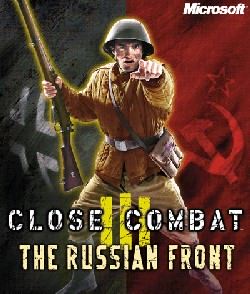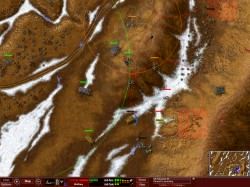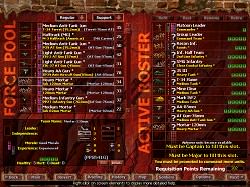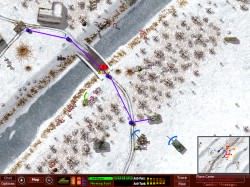| Close Combat III: the Russian Front by Bubba "Masterfung" Wolford |
||||
|
Reviewers Specs:
Coming in January, will be the 3rd part of the Close Combat Series. Although Microsoft publishes the game, the real greatness behind this very successful series is a company named Atomic Games. Close Combat has really hit a sweet spot in the real-time, strategic/simulation market. In the third game of the series, the makers at Atomic Games are modeling the German Invasion of Russia during World War II, Operation Barborrosa. For the first time ever, the game actually spans from the opening of the German invasion in 1941 to the battle of Berlin in 1945. Just as in the other installments of Close Combat, the player must weigh the psychological effects of the war on the soldiers as they react to the players' commands just as real soldiers do. Issue them an order to invade a hill and get many of them killed, and the remaining soldiers may freeze in their tracks. Fear can cause them to turn and run, outright surrender, or go insane and try to kill all the enemy soldiers themselves. Players may recall that in the original Close Combat, the player could name a persona on the field as Commander of his forces. This idea was dropped in Close Combat II (CC2) but makes a welcome return in CC3. Now your persona (Commander) has a direct impact on the moral of your troops. If they begin to flee and are within the Commanders sphere of influence, the likelihood of your troops rallying is more likely. Troops situated near the commander are also more inclined to fight effectively. However, get your Commander killed and your troops morale for that battle may collapse all together. As usual players can command either side of the campaign. For the first time though, players cannot command US troops as only Russian and German forces were involved in the Eastern War. However, the introduction of Russian troops on the Eastern Front has meant a lot more tank duels as more than 300 team types (squads), more than 100 weapon types, 60 soldier types and 80 types of vehicles and AT guns are being individually modeled. New weapons in this build includes, units like 120 mm mortar, flame-throwers (both in soldier units, on tanks and on half-tracks) and rocket artillery mounted on half-tracks, and even off-map heavy artillery barrage. This awesome medley of units can be upgraded as players go though the campaigns. All graphics are in 16-bit color as the AI has been tweaked up along with fabulous looking buildings and terrain. Increased resolutions have also been incorporated as I have been running my builds in 1600*1200. I cannot tell you how AWESOME the game runs when the player has access to higher resolutions. |
Players really needed increased resolutions because the maps are three (3) times bigger than the previous two Close Combat games! This has provided for much more strategic placements of the troops and vehicles. The larger maps make tanks duel simply stunning. Explosions and visual effects have been redone along with all-new sounds. The effect of the battlefield has been greatly increased with troops providing more chatter about what is happening around them. A Resource Allocation System allows players to manage limited amount of reserves by deciding when and where to use them. The campaign battle flow is dynamic and consequences carry forward so that players have to take into account the long-term effects of their actions. They can push forward or get pushed back across maps as German and Russian supplies dictate. Soldiers continue from map to map within campaigns, and map damage carries over to new battles. The idea of carrying over soldiers is that they can really become a vital and close nit group thus making them fight better as a team instead of just individually. Players can also choose now when to rest or refit units and equipment that are either dog tired from too much fighting and not enough rest or for those units too heavily damaged to continue fighting. This adds a new element to the mix making an already very strategic game, better and more thought provoking. Look for CC3 to be an even bigger seller than the first two games of the series. With an increased number of maps, bigger size to each map, bigger and better "Battlemaker" for player created scenarios and the improvements made to the AI, sounds, graphics and charts, CC3 will undoubtedly begin another new era in the real-time strategy/simulation market. System Requirements
|
|||
|
© 1997 - 2000 COMBATSIM.COM, INC. All Rights Reserved Last Updated January 5th, 1999 |
||||




